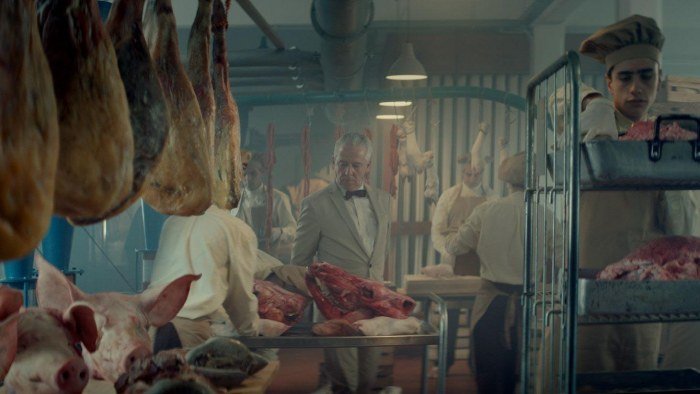SAN SEBASTIAN — Basque cinema is attacking the future with higher industrial and creative expectations than ever, playing off two motors: Co-production with other parts of Spain, international equity partnerships.
Two game-changers in the Basque film landscape, “Handia,” winner of 10 Spanish Academy Goya Awards in 2018, and “Loreak,” Spain’s 2016 Oscar submission, have contributed to consolidate local industry’s self-confidence in recent years.
The resurgence of Basque cinema is led by established production outfits such as Irusoin, Moriarti Produkzioak, Txintxua Films, Kowalski Films and Señor y Señora, whose managing boards combine in many cases talented creators and ambitious producers, which has proved a highly advantageous formula.
“There is an artistic and entrepreneurial ambition to make films that can reach the global market,” says Señor y Señora’s Leire Apellaniz, producer of San Sebastian New Directors player “Las letras de Jordi,” by Maider Fernández, and Aritz Moreno’s Sitges contender “Ventajas de viajar en tren.”
Many taboos have been torn down on the road to the new times. “Now, creators have a much richer range of possibilities than in the past, including the option of making movies in Basque-language,” says “Loreak” and “Handia” producer Xabi Berzosa at Moriarti and Irusoin.
Moriarti, Irusoin and Kowalski produced “Handia,” a film directed by Moriarti partners Jon Garaño and Aitor Arregi, which scored the third best tally of Goya Awards ever, proving a true life-inspired period movie in Basque-language could score standout results.
Sold by Film Factory Entertainment, “Handia” had a strong run at international festivals circuit. In Spain, distributed by A Contracorriente, snagged a solid €750,000 ($837,000) box office for a Basque-language film, luring audiences mainly from the Basque Country and Navarre.
With just 2,2 million inhabitants in Spain, spread over three provinces – Alava, Biscay and Gipuzkoa – the Basque Country’s home market is too small to support many bigger productions.
“Since the production companies are of a medium-to-small size, if you want to get into projects with a bigger budget, you need to look for partners with a larger financial capacity,” says Kowalski’s Koldo Zuazua.
“Co-producing with other Spanish territories or seeking international partnerships is consolidating in a natural way,” says producer Marian Fernández at Txintxua, whose credits take in Telmo Esnal’s “Dantza” and Asier Altuna’s “Amama.”
“The challenge is increasingly work in that direction to make bigger projects,” she adds.
A mark of Basque cinema’s ever.broadening range, “La trinchera infinita” (“The Endless Trench”), a Moriarti and Irusion production, rolled in Andalusia, in Spanish-language, and has just world premiered to Spanish critical acclaim in San Sebastian’s 2019 main competition.
Directed by Garaño, Arregi and José Mari Goenaga, it’s co-produced with Seville-based La Claqueta and France’s Manny Films, starring Antonio de la Torre (“The Realm”) and Belén Cuesta (“Holy Camp”).

“This is a further step in the evolution of Basque production, suggesting that ambitious films can be made from here and lure national and international interest,” Berzosa says.
Distributed in Spain by Entertainment One, a market priority for “Trench” is to conquer the Spanish box office, and access to significant international rights deals, handled by Film Factory.
A recent dystopian future hit, Galder Gaztelu-Urrutia’s feature debut “El hoyo” (“The Platform”) marks a co-production between Basque Films, the Bilbao-based outfit run by Carlos Juárez, and Barcelona’s Mr. Miyagi.
Sold by Latido Films, “The Platform” has just been acquired by Netflix for worldwide except Asia, having won the People’s Choice Award at Toronto’s Midnight Madness, where it world premiered.
A San Sebastian-based outfit whose dedicated modus operandi is co-production, Kowalski partnered with Galicia’s Miramemira, France’s 4A4 Productions and Luxembourg’s Tarantula for Oliver Laxe’s “O que arde,” a Cannes Uncertain Regard Jury Prize winner and San Sebastian Perlak player.
“The more we universalize and travel beyond our borders, the more our cinema will grow,” Zuazua says.
Kowalski is also co-producing Argentine Pablo Aguero’s “Akelarre,” a Spanish and Basque-language historical drama, pitched as a project at San Sebastian’s 2017 Europe-Latin America Co-Production Forum.
Filmed last summer in Gipuzkoa, Biscay and Navarre, “Akelarre” has tapped into attractive Basque tax advantages. Kowalski teamed with Iker Ganuza’s Lamia and created a joint tax break investment vehicle, Sorgin Films, and co-produced with France’s La Fidèle and Tita.
With its own taxation system, each of the three Basque territories offers tax breaks that can reach up to 40% in the case of Gipuzkoa, when it comes to films shot in Basque language, a recently approved measure aimed at growing the local industry.
Public sector policy has traditionally granted support for Basque cinema, becoming a bastion of its development. “There has been a very close collaboration between public institutions, pubcaster EITB and major festivals, especially San Sebastian,” Fernández says.
Popular on Variety
Source: Read Full Article
